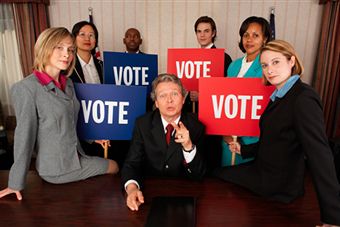Main Content
Lesson 2: Principles of Public Finance - The Role of Government
From Theory to Practice: On Suboptimal Decisions
Thus far, this lesson has centered on the basic principles of public finance that offer theoretical insights into when and how public sector involvement might result in economic efficiency improvements (i.e., decisions that contribute positively to the economic welfare enjoyed in society). It should not surprise you, however, that in practice collective decision making about how to allocate or use public resources does not always result in efficiency improvements. As indicated in the textbook, this discord can partly be attributed to the institutional decision-making framework. A case in point is the use of referendums. Depending on the voters' preferences, a majority vote referendum might reject a decision that would have enhanced economic welfare if undertaken. This can be illustrated by looking at the data presented in the previous review exercise. Again, the data is as the same as in Table 2.1.
A community project (a public good) will cost $2,500 and will benefit the five members of the community as follows:
| Resident | Individual Benefit | Cost Share |
|---|---|---|
| A | $800 | $500 |
| B | $800 | $500 |
| C | $300 | $500 |
| D | $350 | $500 |
| E | $450 | $500 |
As noted earlier, this project would generate a net improvement of $200 to the overall economic welfare. Hence, from an economic welfare perspective it should be undertaken. However, since the cost for each of residents C, D, and E is higher than their perceived individual benefits, they would likely vote against it. Thus, the three "no" votes would turn down this project (i.e., a 2 to 3 vote) and the opportunity to improve the overall economic welfare in the community.
Use of Representative Government

The assumption that elected officials operate in the best interest of their constituents is also a highly contested assumption.
In this course we will largely ignore the use of referendums as a decision-making framework and focus instead on the traditional process that governs fiscal decision making—the use of representative government to raise funds and allocate resources. However, as you are probably aware, reliance on representative government also poses a variety of challenges unless we assume a perfect world in which (1) elected representatives are able to make decisions based on perfect knowledge, and (2) where representatives always utilize this knowledge in ways that best benefit the public (i.e., they are assumed to be "public utility maximizers").
However, as we all know, we do not live in a perfect world, and the above two assumptions rarely hold water in the real world. Elected officials rarely operate under conditions of perfect knowledge. In practice, such knowledge is often tied to individualonstituents’ unique circumstances and is therefore difficult to
capture/collect. Some refer to this unique type of knowledge as private knowledge. Furthermore, it is not uncommon for the information upon which elected officials base their decisions to be biased in favor of a particular decision.
The assumption that elected officials operate in the best interests of their constituents is also a highly contested assumption. Political processes are often characterized by logrolling and political bargaining. As we move through this class, these and other assumptions will be emphasized for purposes of illustrating the complexity of the budget process.
On the next page you will be given an opportunity to delve into and reflect on these difficulties in more detail. Specifically, you will be required to read and reflect on a classic article that explores the practical challenges involved in capturing and using knowledge as a basis of decision making.
